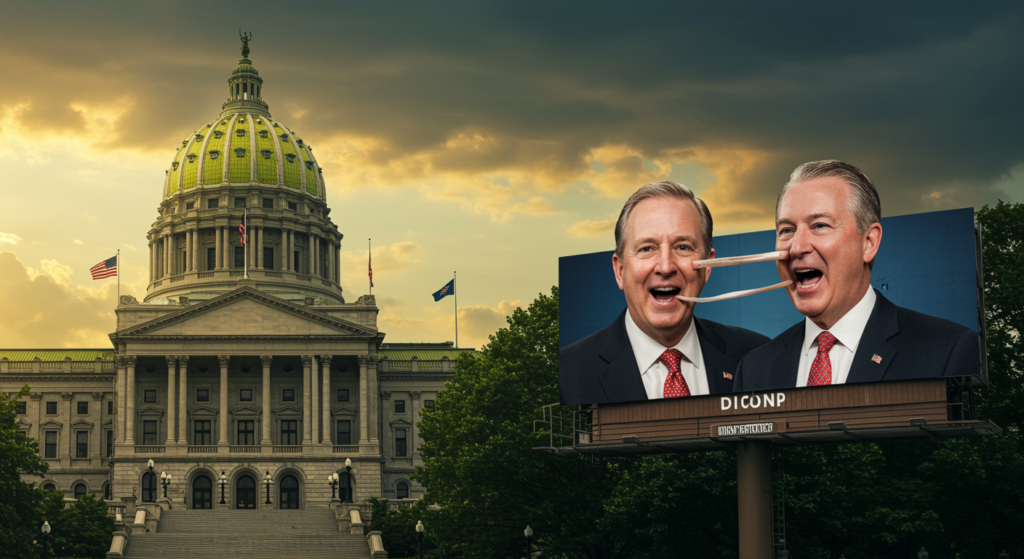
AI Fake Ads: Pennsylvania Lawmakers Propose $250K Daily Penalty
Introduction to AI-Faked Ads Regulation
Pennsylvania lawmakers are stepping up to combat the growing threat of AI-faked ads in political campaigns, proposing a hefty $250,000 daily penalty for violations. This move highlights the urgent need to protect voters from misleading content created by advanced AI technologies. As elections become more digital, ensuring authenticity in ads is crucial—have you ever stopped to think about how a simple video could sway your vote if it’s not real?
The legislation builds on nationwide concerns, where AI’s ability to generate deepfakes—realistic but fabricated media—could erode public trust. By targeting AI-faked ads, Pennsylvania aims to set a precedent for transparency, encouraging campaigns to prioritize honesty over manipulation. This isn’t just about penalties; it’s about fostering a fairer democratic process for everyone involved.
Details of the Proposed Legislation on AI-Faked Ads
At the heart of this bill is a clear stance against deceptive practices, with fines up to $250,000 per day for campaigns caught using AI-faked ads. Lawmakers are focusing on content that impersonates candidates or spreads falsehoods, making it harder for bad actors to gain an edge. This approach could transform how political advertising operates, pushing for stricter oversight before ads even go live.
### Key Components of the Penalty Structure
One key aspect involves defining what counts as an AI-faked ad, such as altered videos or audio that misrepresent reality. Penalties aren’t just financial; they aim to promote campaign integrity by requiring disclosures for any AI-involved content. For instance, imagine a scenario where a candidate’s voice is cloned to say something controversial—under this proposal, that could lead to immediate and severe consequences.
Beyond fines, the legislation encourages ethical AI use, potentially including mandatory audits for high-stakes ads. This not only deters misuse but also educates voters on spotting fakes, like checking for subtle inconsistencies in videos. If you’re involved in campaigns, this is a wake-up call to adopt transparent practices now.
The Risks of AI-Faked Ads in Elections
AI’s role in elections has sparked widespread debate, with AI-faked ads posing a real risk to voter confidence. These deepfakes can spread misinformation faster than ever, turning a fabricated clip into a viral sensation that influences outcomes. What if a false ad derailed an entire election? It’s a scenario that’s already playing out in smaller ways, urging lawmakers to act.
### Understanding Deepfakes and Their Dangers
Deepfakes, essentially AI-generated content that mimics real people, are at the forefront of this issue. They can fabricate speeches or events, making it tough for the average person to discern truth from fiction. In Pennsylvania, this has led to targeted regulations, as seen in recent discussions drawing from sources like the Pittsburgh Post-Gazette.
The broader impact includes eroding trust in media and institutions, which is why protecting election integrity is so vital. A study from reputable outlets, such as those referenced in ongoing AI debates, shows that over 50% of voters worry about fake content swaying results. To counter this, consider simple steps like verifying sources before sharing—it’s an actionable tip that could make a difference in your daily life.
AI Regulation Beyond Campaigns in Pennsylvania
While AI-faked ads in politics grab headlines, Pennsylvania is also eyeing wider AI regulations to balance innovation and safety. Lawmakers are exploring how AI can boost the economy, like in tech hubs, while addressing risks in everyday consumer interactions. This holistic view ensures AI’s benefits, such as job creation, don’t come at the cost of public deception.
### Building a Safe AI Ecosystem in the State
Efforts in Southwestern Pennsylvania aim to attract AI developers, but with safeguards against misuse, including in marketing. For example, proposed bills would require companies to disclose when AI generates ads or customer services, extending the fight against AI-faked content beyond elections. Energy demands from AI infrastructure add another layer, with ideas like using natural gas for sustainable power.
This proactive stance positions Pennsylvania as a leader in AI policy. If you’re a business owner, think about how adopting AI ethics could not only comply with future laws but also build customer trust. It’s a strategy that blends innovation with responsibility, potentially setting a national example.
Looking Ahead: The Future of AI Oversight and Faked Ads
As AI technology evolves, so does the need for robust oversight, particularly for AI-faked ads. Pennsylvania’s proposals are just the beginning, with more discussions on consumer protection and ethical guidelines on the horizon. In the coming months, we might see expanded laws that cover social media and beyond, ensuring AI serves the public good.
From hypothetical scenarios like a deepfake scandal in a local race to real-world applications, staying informed is key. What are your thoughts on how AI could shape the next election? By engaging with these issues, voters and creators alike can push for balanced regulations that encourage innovation without compromising truth.
This forward-thinking approach could inspire other states, creating a ripple effect across the U.S. For policymakers, it means prioritizing education and tools for detecting fakes, turning potential risks into opportunities for growth.
Conclusion
Pennsylvania’s bold move against AI-faked ads with a $250,000 daily penalty underscores the importance of protecting democratic processes. As we’ve explored, this legislation not only addresses immediate threats but also paves the way for broader AI accountability. If you’re passionate about fair elections, consider sharing your insights or learning more about local initiatives.
To dive deeper, check out related topics on our site, and we’d love to hear your feedback in the comments below. Let’s work together to keep AI beneficial and transparent for all.
References
For more context, we’ve drawn from several reliable sources:
– “Pennsylvania elections and artificial intelligence” from Pittsburgh Post-Gazette, available at this link.
– “Pa. lawmakers want beefed-up protections against AI voice, image fakes” from Bradford Era, URL: https://www.bradfordera.com/2024/02/27/pa-lawmakers-want-beefed-up-protections-against-ai-voice-image-fakes-everybody-should-be-on-guard/.
– Additional insights from City & State PA: https://www.cityandstatepa.com/policy/2025/04/ai-not-future-it-current-lawmakers-examine-how-make-pennsylvania-ai-powerhouse/404626/?oref=cspa-skybox-lander.
– GovTech on AI guidelines: https://www.govtech.com/artificial-intelligence/pa-lawmakers-look-to-set-guidelines-on-safe-ai-development.
– State Scoop coverage: https://statescoop.com/pennsylvania-ai-disclosure-legislation/.
– Other sources: https://hernandorealtors.com/news/, https://statecapitallobbyist.com/artificial-intelligence-ai/lawmakers-addressing-ai-in-campaigns/, and https://www.crowell.com/a/web/rmYsUfUqWt3tuwCwa95AoU/4Ttkbq/antitrust-enforcement-in-the-biden-administration-five-things-to-watch.pdf.
AI-faked ads, Pennsylvania lawmakers, AI in campaigns, election integrity, deepfakes regulation, AI penalties, campaign transparency, AI misuse prevention, Pennsylvania AI policy, voter protection




